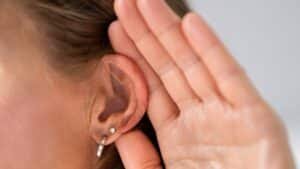
Emerging research has observed a strong link between hearing loss, tinnitus, menopause, and hormone therapy. According to a team of doctors at Brigham and Women’s Hospital in Boston, hormone therapy can increase your risk of hearing loss and tinnitus if using pills, patches containing estrogen only or combined with progesterone.
The studies also showed that women who experience menopause at an older age, 50 and beyond, are at a higher risk for hearing loss.
Are you currently experiencing symptoms of menopause and hearing loss/tinnitus? Do you want to learn more?
If you find yourself asking people to repeat themselves or you are turning up the volume more and more often, you are not alone, and while hearing loss affects millions of women every single day, menopause could be playing a part. Like, seriously, I’ve heard menopause is bad enough, now this!
New research from Harvard Health Publishing cites that hormones can be blamed for everything from depression to hot flashes to yes, hearing loss. In fact, their studies suggest that prolonged use (10+ years) of oral estrogen puts you at higher risk for hearing loss/tinnitus as well as women who experience menopause after age 50.
If you are having trouble hearing or you are experiencing tinnitus (ringing in the ears), “listen up” and read on.
Hearing Loss and Menopause
Decreases in estrogen can sometimes trigger menopause symptoms such as hot flashes, night sweats, depression, frequent urinary tract infections, the dreaded mood swings, fatigue, weight gain, vaginal dryness, and itching and pain during sexual intercourse (and I’m sure I’m missing some!). Estrogen plays a significant role in the body (muscles, heart, brain, bones). Estrogen is also located in the receptors in our ear cells and auditory pathways.
After you stop menstruating, your ovaries produce less and less estrogen, and low estrogen levels can impair hearing. This is what we believe to be the alterations in blood flow to the cochlea (hollow tube in the inner ear). The yin to estrogen’s yang is progesterone which begins to decrease in the mid to late 30s.
Combined together, this is a recipe for hearing loss, tinnitus, and sometimes vertigo in your 60s and beyond.
If you are taking hormone therapy, please monitor your hearing and only take HT as long as needed.
So, What Can You Do to Protect Your Hearing?
First and foremost, be sure to have your hearing checked by a doctor of audiology to find out the exact cause of hearing loss. While it may be menopause or HT, don’t assume. There are so many causes for hearing loss and tinnitus.
Diet, exercise and maintaining a healthy weight definitely help. For some scrumptious recipes for active aging, please grab a free copy of my cookbook. In addition, be mindful of prescribed medications that are sometimes linked to hearing loss (ask your doctor) as well as over-the-counter pain relievers such as acetaminophen and ibuprofen which have also been linked to hearing loss if taken more than 2 to 3 times a week.
Be aware that other conditions can be connected to hearing loss, i.e., rheumatoid arthritis, diabetes, autoimmune diseases, and more. These conditions disproportionately affect women.
Finally, stay away from loud or constant background noise. Do your best to prevent hearing loss as you age, and I wish you well in menopause.
For more in-depth information on hearing loss, tinnitus, and more, please feel free to visit www.excellenceinaudiology.org.
Let’s Have a Conversation:
Have you been on Hormone Replacement Therapy? Has it affected your hearing? When was the last time you had your hearing checked?





